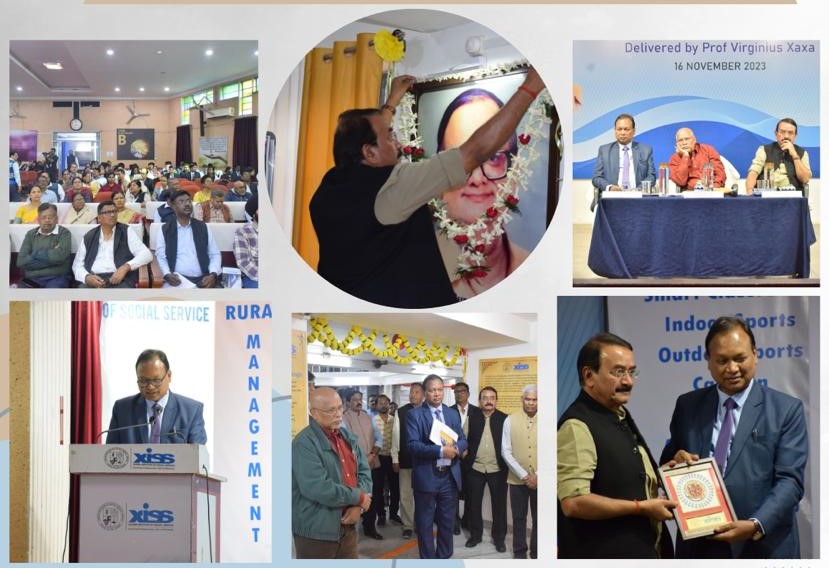First Dr Kumar Suresh Memorial Lecture delivered by Prof. Virginius Xaxa, Chairman Xaxa Committee

Xavier Institute of Social Service (XISS), Ranchi, organised the First Dr Kumar Suresh Singh Memorial lecture on 16 November, at the Fr Michael Van den Bogaert SJ Memorial Auditorium. The event was organised by Dr Kumar Suresh Singh Tribal Resource Centre, XISS on the 90th birth anniversary of Dr K S Singh.
The theme of the memorial lecture was “Tribal Situation THEN (2013) and NOW (2023).” In 2013, Prime Minister, Dr Manmohan Singh constituted a High-Level Committee (HLC), under the chairmanship of Prof. Virginius Xaxa, mandating it to examine the socio-economic, educational and health status of tribal communities in India and recommend appropriate interventional measures to improve the same.
The guests included the speaker of this memorial lecture Prof Virginius Xaxa along with Dhruv Singh, son of Dr Singh and his family, and several guests including friends and colleagues of Dr Singh who were present to honour the legacy of the late scholar. The commemorative program began with a heartfelt homage paid to Dr K.S. Singh at the Resource Centre, by all dignitaries, Heads of all Programmes at XISS, Faculty, and Staff followed by the main memorial lecture.
Dr Joseph Marianus Kujur SJ, Director, XISS, commenced the proceedings with a warm welcome address. Dr Kujur set the tone for the evening, outlining the theme and dynamics of the memorial talk, offering attendees insight into the profound impact of Dr K.S. Singh's work and contributions. He said, XISS is proud to establish a tribal resource centre in the name of such an eminent and renowned civil servant, a historian and anthropologist. The purpose of establishing this resource centre is to give recognition to the contributor and to encourage scholars across the country to consult his findings for further research in tribal development. This memorial lecture discusses the situation of tribals over different development indicators such as Tribal Sub-Plan, Health, Education, Poverty etc over the past 10 years. Dr Kujur also stated that XISS is hopeful that this memorial lecture will attract various scholars to the centre in future and XISS will be able to contribute to the literature on tribes at large.

Further in the memorial lecture stressing more on the theme, Prof. Xaxa, Professor Emeritus, presented the tribal situation in India, referencing key issues outlined in the 2014 report by the Xaxa Committee. He highlighted the high allocation of budget for Schedule Tribe development citing allocation of Rs 78256.31 crores in Union Budget 2021-22, for Scheduled Tribe Component (STC) and Rs 12461.22 crores for Development Action Plan for Schedule Tribes in 2023-24. He mentioned in his speech that there has been an improvement in the situation of tribal people in terms of infrastructure and basic facilities. He also discussed that from 2012 to 2018, there has been an increase of 5% in roads and connectivity across the tribal regions, while a 12 % increase in electricity connection, 11.6% increase in drinking water facilities, and 35% increase in toilet facilities for ST households.
However, he added that poverty among tribes in India has also increased since 2005-06. There has been decline in Work Participation Rate (WPR) among STs from 70% in 1999-2000 to 54.1% in 2017. In terms of health services, he pointed out that public health infrastructures like sub-centers and primary health centres are deficit in numbers especially in states like Jharkhand, Odisha, Madhya Pradesh, Maharashtra, and Rajasthan causing a major impact on tribal health. He discussed the National Education Policy (NEP) 2020, which promotes regional language is however oblivious of tribal languages and has limited impact among the tribal students.
Lastly, he discussed about how various attempts have been made in diluting the protective provisions given in the constitution for the tribal people such as Chhota Nagpur Tenancy Act, Santhal Pargana Tenancy Act, Land Acquisition, Rehabilitation and Resettlement Act, India Forest Act, EIA process for environmental clearance etc. through different amendments introduced by the government. He also mentioned that the main issue lies in the violation of these protective measures and that the key issues with which tribes in India have been confronted remain intact.
About the Dr K S Singh Tribal Resource Centre
The Resource Centre features approx. 3500 books, more than 400 manuscripts, handwritten and typed notes of Dr Kumar Suresh Singh on a range of topics including Birsa Munda, Tribal Movements in India, Tribal Society of India etc. The Resource Centre is in process of digitalising the entire centre for people to access from across the world. For more details on the vast collection available, membership policy and timings of the resource centre, one can connect with the XISS Library through the website.





